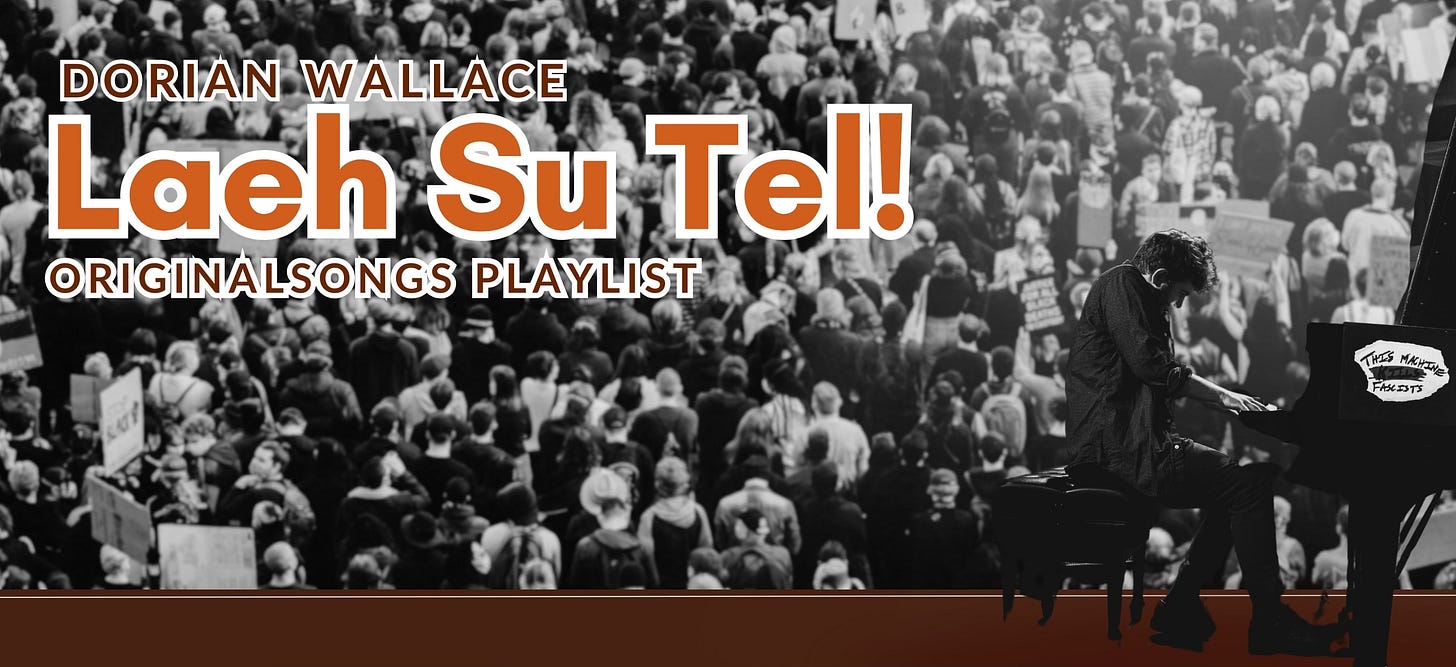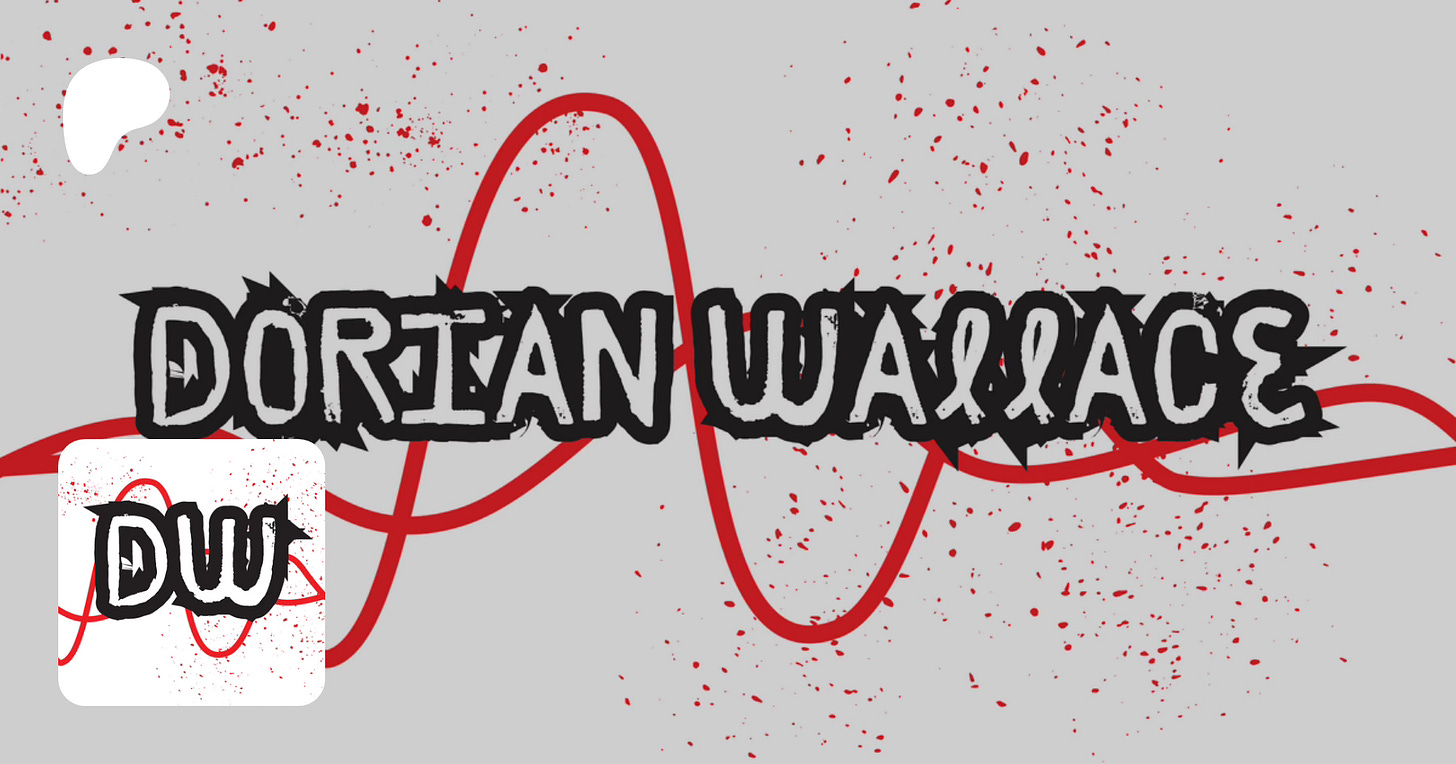Land Acknowledgment
This performance and the recordings it accompanies were created on Lenapehoking, the ancestral and unceded lands of the Munsee-speaking Lenape and Canarsie peoples, whose history, presence, and care for this land continue today. We honor their enduring relationship with this place.
To learn more or support Lenape communities, see further down the page.
Tonight’s Program
One Love / People Get Ready
Bob Marley, Curtis Mayfield (1977)Genjer-genjer
Muhammad Arief (1942)Hasta Siempre
Carlos Puebla (1965)Nivişta Gerîla
Şêro Hindê, Mehmûd Berazî (1990s)It Is One Hundred Seconds to Midnight
Dorian Wallace (2020)Hand Over the Keys to the Country / سلم مفاتيح البلد
Mohammed Wardi (1980s)Beloved Comrade
Jack Beeson, Abel Meeropol (ca. 1930s–1940s)The Partisan / La Complainte du partisan
Anna Marly, Emmanuel d’Astier de la Vigerie, Leonard Cohen adaptation
(1943 original / 1969 adaptation)Solidarity Forever
Ralph Chaplin (1915)Closing Verse
Lu’Keus Jochhanan (2025)Insta: @thereallukeus
Tiktok: @shadowtalktv
The Internationale
Eugène Pottier, lyrics (1871), Pierre De Geyter, music (1888)
Dorian Wallace, piano
Laeh Su Tel!
Laeh Su Tel! has been a dream of mine for a long time on the concept of creating a fully improvised solo piano project based on a repertoire of political songs from diverse traditions. I immersed myself in locating, studying, and deeply internalizing a library of resonant political music from a wide range of cultural, social, and historical contexts.
Over time, this concept album grew into a concept series, unified by the theme of authentic musical expression as an act of solidarity for the working-classes, underclasses, and Indigenous peoples of the world, a celebration of revolutionary love and collective consciousness. I hope to evangelize the potential of music therapy in addressing trauma-informed care, neurodivergent awareness, and critical social analysis rooted in the fight for liberation and solidarity for all people!
Part 1: Psychology in a New Key
Psychology in a New Key explores the intersection of political expression, therapeutic music making, and internal and external liberation. This album reflects my belief that music connects inner psychological processes with external political expression. I aim to cultivate critical consciousness and challenge the systems of oppression that thrive under capitalism and fascism. The nine tracks on this album center themes of solidarity, historical reflection, and radical empathy.
Part 2: A Healing Sound for the People!
Both political revolution and psychological healing require dismantling oppressive systems—whether societal or internal—and building empowering, liberating frameworks in their place. This album focuses on collective resistance, empowerment, and solidarity, emphasizing the interconnected nature of personal and political struggles. I aim to show that healing is not an isolated process but a communal one. A Healing Sound for the People! is my expression that healing and revolution are acts of hope, renewal, and the objective of an equitable world.
— Dorian Wallace, MT-BC
Part 1: Psychology in a New Key
One Love / People Get Ready
Bob Marley's "One Love" merges with Curtis Mayfield's "People Get Ready" into a revolutionary anthem that champions love, unity, and coordinated action against oppression and trauma.
Hasta Siempre
Carlos Puebla's ode to Che Guevara, Hasta Siempre, embodies the Cuban Trova tradition and reflects strategic and passionate resistance to injustice.
Himno Zapatista
Rooted in Mexico's corrido tradition, the Zapatista Anthem rallies workers and Indigenous revolutionaries, amplifying their fight for autonomy, justice, and libertarian socialist objectives.
Lord Is Coming
H.E.R.'s Lord Is Coming uses spiritual imagery to address societal struggles and systemic oppression, encouraging reflection and collective responsibility in times of sorrow.
Genjer-Genjer
Composed by Muhammad Arief, Genjer-Genjer reflects the hardships faced by the people of Banyuwangi during the Japanese occupation. The lyrics tell of peasants forced to eat the genjer plant—once considered a weed—for survival. This song stands as a cultural resistance and resilience of the peasantry under colonial oppression.
Once to Every Soul and Nation
Adapted from James Russell Lowell's poem written as a protest against the Mexican-American War, this hymn condemns imperialism and slavery, calling for principled courage and resistance to oppression across generations, including the American Civil Rights movement.
The Partisan
Anna Marly's anti-fascist anthem, The Partisan, pays tribute to the French Resistance against Nazi occupation. Using Leonard Cohen's harmonic progression as a base, this haunting chorale elicits the sacrifices made in the fight against fascism, harmonizing political moments of the past with timeless resonance.
Long Violent History
Connecting systemic racism and class struggle, Tyler Childers' Long Violent History exposes a shared oppression between Black Americans and Appalachian miners. The song calls for dismantling white supremacy, fascism, capitalist exploitation, and the police violence that sustains it.
Solidarity Forever
Ralph Chaplin's anthem, Solidarity Forever, calls for workers internationally to unite in the fight for equity and liberation. It advocates the abolition of the wage system and the creation of a new world based on justice, worker ownership, and solidarity.
Part 2: A Healing Sound for the People!
The Message
Grandmaster Flash and the Furious Five's The Message (1982) brought a revolutionary approach to hip-hop, orienting an explicit social commentary to the art form. This masterpiece became foundational to the musical DNA of conscious hip-hop, addressing poverty, white supremacy, and systemic violence.
Beloved Comrade
Written by the renowned country bluesman Josh White, Beloved Comrade is an emotional elegy deeply rooted in African American and labor song traditions. The piece integrates a solemn lament with a resolute vow that "the fight will still go on."
Hand Over the Keys to the Country
Nubian Sudanese luminary Mohammed Wardi's Hand Over the Keys to the Country critiques corruption and human suffering under Omar Al-Bashir's authoritarian rule. First performed during Wardi's exile in 1997, it has continued as a rallying cry for the Sudanese uprising of 2018 and a symbol of cultural dignity and justice.
Daloy Politsey
The Yiddish-language protest song Daloy Politsey is about class inequality, police brutality, and systemic corruption. Associated with Bundist (Jewish socialists) and Jewish anarchist movements in Tsarist Russia, it remains an emphatic sound of anti-authoritarian solidarity.
It Is One-Hundred Seconds to Midnight
It Is One Hundred Seconds to Midnight is inspired by the Doomsday Clock, a symbol created by the Bulletin of the Atomic Scientists to represent the likelihood of human-made global catastrophe. Originally written for the 50th Anniversary of Earth Day in 2020 and premiered during the COVID-19 pandemic, the 2024 version was 90 seconds long, and tonight’s 2025 version is 89 seconds long, mirroring the clock’s current setting of 89 seconds to midnight.
Unity Is Strength
Composed in 1943 by Mu Hong and Lu Su for their opera of the same name, Unity Is Strength, evolved into a song celebrating resilience and solidarity among numerous Chinese guerrilla groups during the Second Sino-Japanese War. It became a powerful messaging song and a symbol of collective strength and hope for a united future.
Nivişta Gerîla
Written by Şêro Hindê and Mehmûd Berazî, Nivişta Gerîla tells the emotional story of two young lovers from Rojava intertwined with the Kurdish guerrilla struggle. Love, sacrifice, and revolution echo the enduring human spirit in the fight for liberation.
Which Side Are You On?
Florence Reece composed Which Side Are You On? in 1931 during the Harlan County War, a violent labor struggle in Kentucky. The song has become a timeless anthem of labor solidarity and a rallying cry for workers' freedoms and social justice.
The Internationale
The Internationale, with lyrics by anarchist Eugène Pottier (1871) and music by Marxist Pierre De Geyter (1888), is a proletarian internationalist anthem that has been adopted by socialist, anarchist, communist, democratic socialist, social democrat, and labor movements. It embodies the spirit of worker unity in overthrowing oppressive forces and remains an international support music of resistance, solidarity, and radical cooperation.
Organizations You Should Support
Consider supporting one of these organizations doing vital work. Support does not need to be financial. You can attend an event, reach out to ask how you can help, or simply spread the word among friends and family. These groups are leading important, community-based work:
H.O.L.L.A! – healwithholla.com
Youth-led healing justice, political education, and leadership development.Musicambia – musicambia.org
Bringing music education into prisons to support healing and growth.Man Up, Inc. (MUSA) – manupinc.org
Brooklyn-based community violence prevention, youth programs, and job training.Katal Center – katalcenter.org
Organizing in CT and NY to end mass incarceration and the drug war.
To learn more about or support Lenape communities, consider these organizations:
Lenape Center - Promoting Lenape culture through community and the arts in Manhattan.
American Indian Community House - Supporting Native Americans in New York City.
Lenape Nation of Pennsylvania - Advocating for Lenape culture and traditions.
Nanticoke-Lenni Lenape Tribal Nation - Promoting Native American welfare in the Delaware Valley.
Lenape Indian Tribe of Delaware - Preserving Lenape heritage in Delaware.
Federally Recognized Tribes (U.S.):
Delaware Nation - Anadarko, Oklahoma
Delaware Tribe of Indians - Bartlesville, Oklahoma
Stockbridge-Munsee Community - Bowler, Wisconsin
First Nations (Canada):
Munsee-Delaware Nation - Near St. Thomas, Ontario
Moravian of the Thames First Nation - Near Chatham-Kent, Ontario
Delaware of Six Nations - Two reserves near Brantford, Ontario
State-Recognized and Unrecognized Groups:
Lenape Indian Tribe of Delaware (state-recognized in Delaware)
Nanticoke-Lenni Lenape Tribal Nation (state-recognized in New Jersey)
Ramapough Lenape Nation (state-recognized in New Jersey)
Lenape Nation of Pennsylvania (Easton, Pennsylvania; unrecognized federally)
Dorian Wallace is a composer, pianist, and board-certified music therapist committed to harnessing music's healing qualities for therapeutic work, social justice, and community engagement. His music integrates contemporary classical composition, reflexive improvisation, and therapeutic practices with a focus on addressing systemic inequalities and fostering resilience. His music is deeply rooted in creating emotionally resonant and socially meaningful experiences.
Dorian's compositions often delve into sociopolitical, emotional, and psychological themes. He has collaborated with artists such as Paul Pinto, Pamela Z, Bonita Oliver, and John Sanborn. His distinctive style combines elements of dissonance, expressionism, romanticism, rhythmic complexity, and intricate textures, offering thought-provoking and cathartic experiences. Dorian is a regular collaborator with the Sing In Solidarity chorus, making music to amplify the voices of activists, those experiencing marginalization, and the international labor and liberation movements.
Dorian, alongside violinist Hajnal Pivnick, is a co-founder of Tenth Intervention, a new music collective based in New York City that coordinates social activism, cultural connection, and artistic exploration. The collective's projects have included For Our Courageous Workers, a tribute to frontline workers during the COVID-19 pandemic; Songs for the Resistance, celebrating labor and justice movements; Colectivo: Music from Cuba and New York, fostering collaboration between Cuban and NYC composers; the Silent House Series, featuring live scores for silent films; and performances of 20th-century classics like Pierrot Lunaire, Eight Songs for a Mad King, and Perfect Lives, alongside new commissions by 21st-century composers.
As a music therapist, Dorian has worked extensively with incarcerated populations at Rikers Island, Crossroads Detention Center, and Sing Sing Correctional Facility, survivors of coercive groups through the Lalich Center for Cults and Coercion, and hospice patients at Calvary Hospital. He incorporates active music listening, improvisation, and lyric analysis to aid participants in processing trauma and grief, building resilience and navigation skills, and reclaiming their relationship with music. Dorian has presented on Liberation Music Therapy at institutions such as Columbia University, Trauma Research Foundation, Montclair State University, University of Louisville, Loughborough University's Anarchism Research Group, American Humanist Association's Center for Education, AMTA Symposiums, and MAR-AMTA Conferences. He has facilitated workshops for adult industry workers through Pineapple Support, activists experiencing burnout through Democratic Socialists of America, and people transitioning out of insular communities with Footsteps.
Dorian is a sought-after dance and ritual accompanist in New York City, crafting dynamic and responsive soundscapes. He teaches Music for Dancers 1 and 2 at the Martha Graham School, centering concepts of rhythm, collaboration, and musicality for dancers to deepen their relationship with music. As part of Tenth Intervention's Silent House series, Dorian has accompanied silent films at venues such as Nitehawk Cinema, Threes Brewing, and the late Videology.
Dorian's multidisciplinary approach and dedication to community engagement offer a unique perspective on the intersection of art, healing, and social change. www.dorianwallace.com
Laeh Su Tel! Merch Store
Come hang out after the show!
BierWax
556 Vanderbilt Ave, Brooklyn, NY 11238











